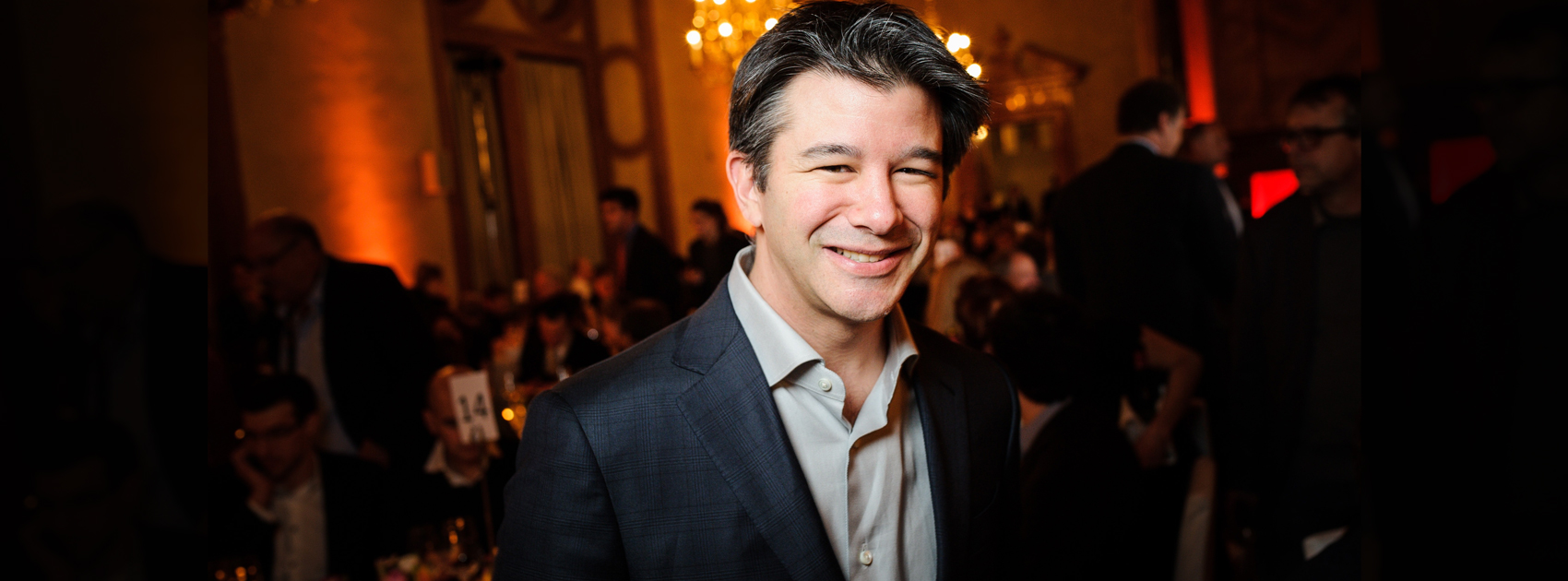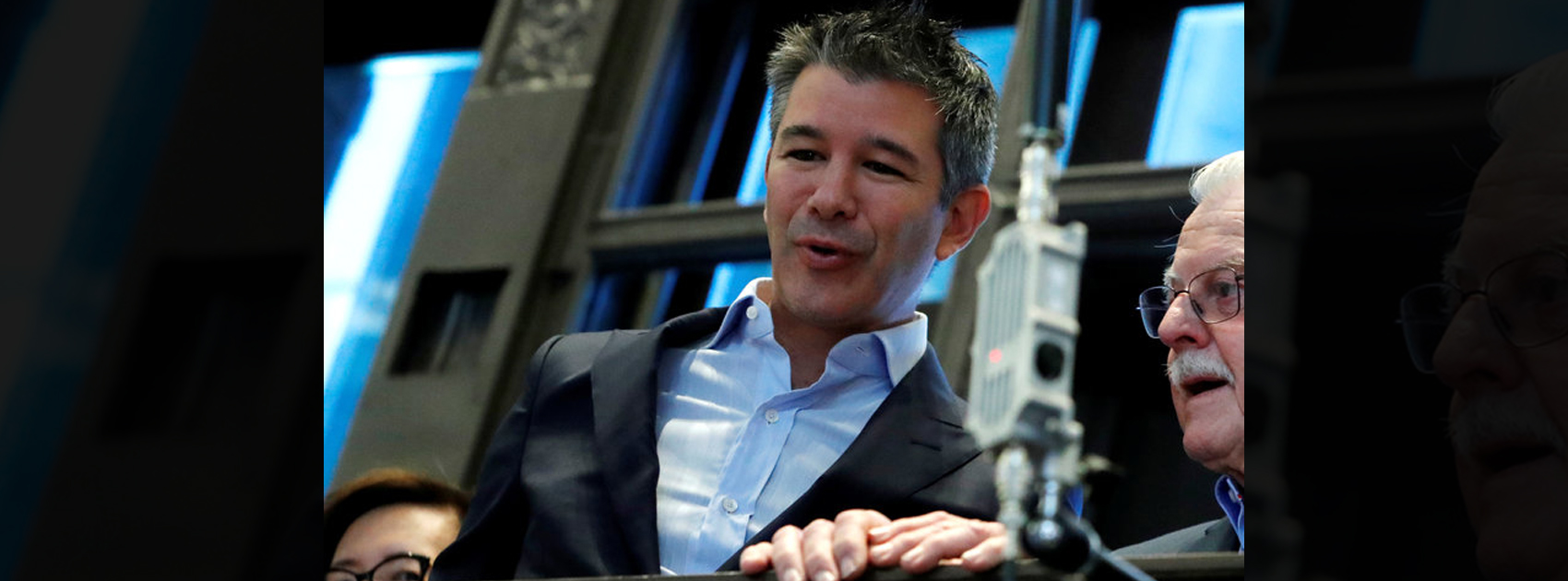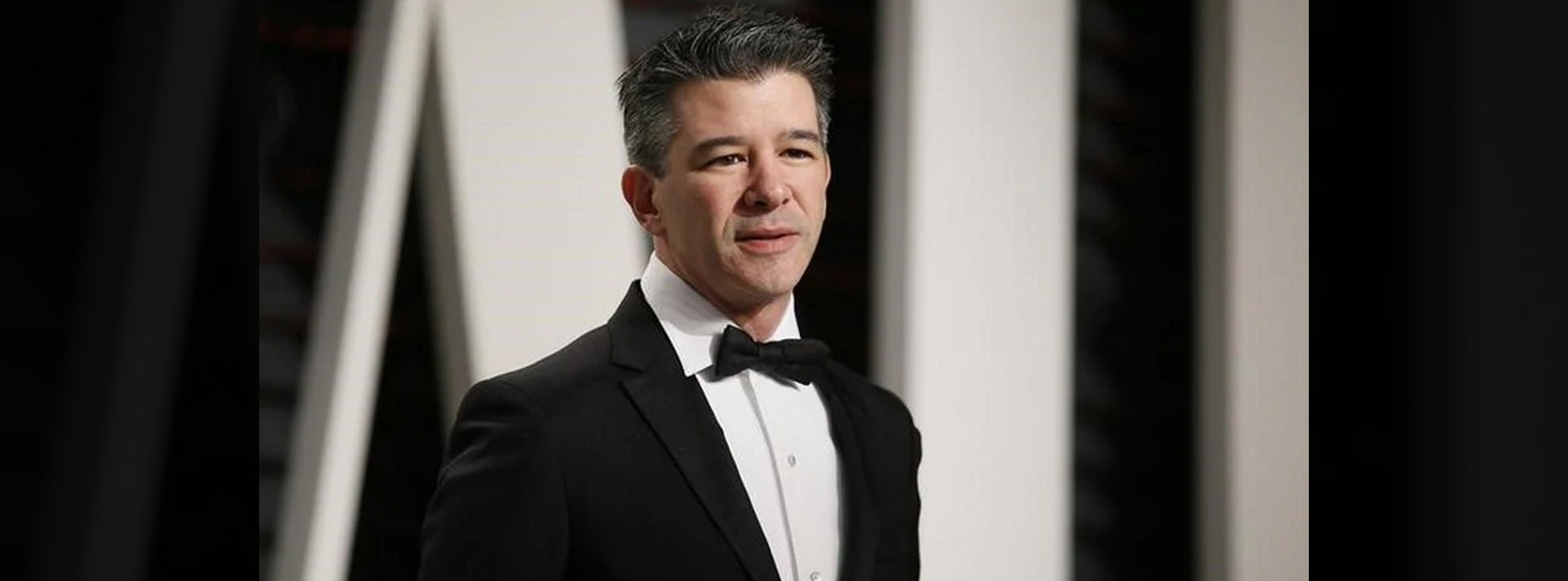Entrepreneur Stories
Travis Kalanick Unknown Facts

Travis Kalanick, the co founder of Uber, is famous for turning the startup into a billion dollar company. Let us take a look at some unknown facts about Travis Kalanick.
Unknown facts about Travis Kalanick

1) Travis Kalanick was introduced to the entrepreneurial world from an early age, when he started selling knives door-to-door for a cutlery company called Cutco during his childhood.
2) Although he is widely known for starting companies like Uber, Scour and Red Swoosh, Kalanick started his first business at the age of 18. Along with a friend, Kalanick started a SAT prep business called New Way Academy.

3) Travis Kalanick was a very smart child. He became interested in computers at an early age and learned how to code by the time he was in middle school. Moreover, Kalanick scored 1580 out of 1600 in his SAT.
4) In 2001, Kalanick started a company called Red Swoosh. In order to save money, Kalanick started living with his parents and eventually moved to Trivandrum, India and then to Thailand.

5) Travis Kalanick is a passionate Wii Sports Tennis player and plays the video game during his spare time. According to investor Chris Sacca, Kalanick was ranked the second best player in Wii Sports Tennis in the world.
6) Travis Kalanick is known for his aggressive behaviour and once sent Instagram a cease and desist letter by posting it on the photo sharing social media platform, along with the caption, “Charming greeting card from a taxi cartel representative.”
7) Despite his billionaire status, Travis Kalanick is famous for being a frugal person. He is known to intentionally forget his wallet during team lunch and staying in cheap hotels while on vacation.

8) Travis Kalanick’s house, which he purchased after selling Red Swoosh, is famously known as the Jam Pad. This is because Kalanick’s house became the go to place for young entrepreneurs to hang out and discuss ideas. Kalanick’s house also has its own Twitter account.
With a net worth of $ 5.28 billion, Travis Kalanick is one of the richest entrepreneurs in America. Which of these unknown facts about Travis Kalanick surprised you the most? Comment below and let us know.
Entrepreneur Stories
Zupee Bolsters Short-Video Play with Vertical TV Acquisition Under INR 40 Cr

Delhi NCR-based gaming startup Zupee has acquired Mumbai-based microdrama platform Vertical TV in a deal valued under INR 40 Cr. This move strengthens Zupee Studio, its short-video arm launched in September 2025, by integrating Vertical TV’s expertise in bite-sized dramas like romance and thrillers.
Facing challenges from India’s 2025 real-money gaming ban, Zupee valued at $1 Bn after raising $120 Mn has pivoted to non-gaming content, including recent layoffs of 40% of its workforce. The acquisition builds on its November 2025 purchase of Australian AI firm Nucanon for interactive storytelling, targeting its 200 Mn+ users with engaging, mobile-first formats.
This deal underscores the rising microdrama trend in India, helping Zupee diversify amid regulatory pressures and compete in the short-video space dominated by quick, shareable content for on-the-go audiences.
Videos
T.N. Seshan: The Fearless Reformer Who Redefined Indian Democracy

T.N. Seshan’s name stands tall in India’s history as the man who transformed the nation’s electoral system with extraordinary courage and integrity. Born in 1932 in Kerala, Seshan grew up with values of discipline, education, and service to the nation — virtues that shaped his illustrious journey. From his early brilliance at Madras Christian College to his advanced studies in public administration at Harvard University, Seshan’s path reflected rare determination and intellect. Joining the Indian Administrative Service in 1955, he built a reputation as a no‑nonsense officer committed to efficiency and honesty, serving in key roles such as Secretary of Defense and overseeing vital national programs.
As the Chief Election Commissioner of India in 1990, T.N. Seshan sparked a new era of electoral integrity. In a system once marred by corruption, violence, and malpractice, Seshan brought order, fear, and respect through his groundbreaking reforms. He introduced voter ID cards, imposed strict spending limits on campaigns, and insisted on transparency at every level of the election process. Despite criticism from political circles that labeled him dictatorial, his relentless pursuit of fairness empowered every citizen to vote fearlessly. Under his leadership, the Election Commission became a symbol of strength and integrity in Indian democracy.
Seshan’s passing in November 2019 marked the end of an era, but his message continues to resonate across generations. Leaders from every corner of the country mourned the loss of the man who restored faith in free and fair elections. His enduring legacy reminds us that true leadership lies not in wielding power, but in serving people with honesty, courage, and conviction. T.N. Seshan’s life remains a timeless inspiration a reminder that democracy thrives only when its citizens are vigilant, responsible, and fearless.
Entrepreneur Stories
Indian Man Quits JPMorgan, Takes 70% Pay Cut to Launch $6 Million Startup

Leaving behind a high-paying job at JPMorgan, an Indian entrepreneur embraced a 70% salary cut to pursue true purpose and passion in the startup world. Disenchanted with what he described as a “robotic” corporate routine, he sought meaningful work that made a real impact. This pivotal decision marked the beginning of his new journey, one focused on value creation rather than titles and corporate perks.
Powered by resilience and fresh perspective, the entrepreneur launched his own startup, prioritizing innovation and hands-on solutions. The road was challenging, but his vision resonated with the market: the startup quickly gained traction and raised $6 million—an impressive acknowledgement of its potential in a competitive landscape. Every hard lesson from early setbacks and bootstrapping paid off in real customer growth and investor confidence.
Today, his journey stands as an inspiring example for professionals seeking authentic success outside the corporate grind. By trading comfort for creative freedom, he grew a venture that solves important problems, generates jobs, and builds wealth beyond just salary. For ambitious founders, his story highlights the power of risk-taking, adaptability, and relentless focus on impact in India’s thriving startup ecosystem.













iwin
November 8, 2025 at 3:09 pm
iwin – nền tảng game bài đổi thưởng uy tín, nơi bạn có thể thử vận may và tận hưởng nhiều tựa game hấp
站群程序
November 11, 2025 at 8:09 am
搭载智能站群程序,自动化搭建与管理,为SEO项目提供核心驱动力。站群程序
MM88
November 13, 2025 at 9:12 am
Khám phá thế giới giải trí trực tuyến đỉnh cao tại MM88, nơi mang đến những trải nghiệm cá cược thể thao và casino sống động.
MM88
November 16, 2025 at 2:49 pm
Với giao diện mượt mà và ưu đãi hấp dẫn, MM88 là lựa chọn lý tưởng cho các tín đồ giải trí trực tuyến.
GO88
November 17, 2025 at 4:56 am
Tham gia cộng đồng game thủ tại Go88 để trải nghiệm các trò chơi bài, poker phổ biến nhất hiện nay.
Kuwin
November 22, 2025 at 3:47 pm
kuwin sở hữu kho game đa dạng từ slot đến trò chơi bài đổi thưởng, mang đến cho bạn những giây phút giải trí tuyệt vời.
N1Bet Echtgeld Casino
December 20, 2025 at 7:41 pm
Viele Spieler bevorzugen in diesem Zusammenhang
die Freispiele als Angebot ohne Einzahlung. Neue Online Casinos bieten verschiedene
Arten von Boni an, die Du ohne Einzahlung erhalten kannst.
Dies funktioniert so, dass die Online Casinos Dich dazu auffordern, einen bestimmten Wert des Bonus ohne Einzahlung
zu setzen, um ihn zu erhalten. Wie bereits erwähnt, zahlst
Du im Voraus kein eigenes Geld ein, um Zugang zu einem Bonus im Online Casino zu erhalten. Um das kostenlose Geld zu erhalten,
musst Du nach Deiner Anmeldung häufig noch einen Teil Deines eigenen Geldes
ausgeben. Die zweite Möglichkeit für einen Bonus ohne Einzahlung sind
Freispiele, wobei es auch hier Umsatzbedingungen gibt.
Manche Casinos erlauben den Einsatz auch bei Live Casino oder
Tischspielen – das hängt vom Anbieter und den Bonusbedingungen ab.
Denke daran, verantwortungsvoll zu spielen und stets die geltenden Geschäftsbedingungen zu beachten. Die Lizenzierung,
die Vielfalt der Spiele, die angebotenen Zahlungsmethoden und die Qualität
des Kundensupports sind allesamt entscheidende Faktoren, die die Qualität eines Online Casinos ausmachen.
Ihr könnt dieses Gratis-Guthaben auf bestimmte Casinospiele oder Wetten verwenden und
so den Bonus ohne Risiko testen. Ein Online Casino Bonus ohne Einzahlung
(auch No Deposit Bonus) wird sofort nach der Registrierung
gutgeschrieben, ohne dass eine Echtgeld-Einzahlung
erforderlich ist. Du weißt also vorab, was dich
erwartet und worauf du achten solltest, um deinen Online Casino Bonus ohne Einzahlung in Echtgeld zu verwandeln.
References:
https://online-spielhallen.de/ihr-verde-casino-cashback-eine-umfassende-analyse/
Bethall Casino Erfahrungen 2026
December 21, 2025 at 5:17 pm
Melden Sie sich noch heute bei X7 Casino an und sichern Sie sich ein Willkommensbonuspaket mit Freispielen ohne Einzahlung und einem exklusiven Ersteinzahlungsangebot.
Melden Sie sich im X7 Casino an und Sie können 10 Freispiele ohne Einzahlung für Big Bass Bonanza sowie einen 500% Ersteinzahlungsbonus
bis zu €1.000 erhalten. Neukunden erhalten im X7 Casino einen exklusiven Willkommensbonus von 500% bis zu 1.000€ und
50 Freispiele in Big Bass Bonanza. Zusätzlich bietet das x7 Casino die Möglichkeit, alle Slots im
Demo-Modus zu spielen. Die Spiellobby bietet eine ausgezeichnete Auswahl mit mehr als
6.500 Spielen, einschließlich Slots, Tischspielen, Jackpot-Spielen, Megaways und Live-Dealer-Spielen. Neben den Freispielen sind attraktive Reload
Boni ein häufiges Geschenk, das du in der Weihnachtszeit im x7 Casino
finden könntest.
Der Support ist per Mail an oder über den in die Casino-Website
integrierten Live-Chat zu erreichen. Die User finden im X7
Casino Spiele von mehr als 50 der besten Hersteller.
X7 bietet die passenden Zahlungsmethoden für jeden Geschmack.
Um diese zu erhalten, musst Du der Reihe nach bestimmte Aufgaben erfüllen.
Da es sich um ein neues Online Casino handelt, gibt es noch wenige Nutzerbewertungen über
die Plattform zu finden. Dafür bietet das Casino im Nutzerkonto
Optionen zur Festlegung von Einsatzlimits
sowie auf der Webseite einen Selbsteinschätzungstest an. Im
Anschluss haben wir die gängigsten Einzahlungsmethoden und ihre jeweiligen Limits für dich aufgeführt.
References:
https://online-spielhallen.de/umfassende-instant-casino-bewertung-fur-deutsche-spieler/
Online gambling Australia $10 deposit
December 26, 2025 at 9:45 pm
July and August are the coldest months with temperature at around 10°c.
Stay updated with localized weather information tailored for Casino.
On Tuesday, a significant warming trend with temperatures reaching 31°C.
Showers late at night. Afternoon showers. NNW winds shifting to E at 15 to 25 km/h.
Partly cloudy. Skies clearing late.
Winds south to southwesterly 15 to 20 km/h tending south to
southeasterly 20 to 30 km/h during the morning then becoming light during the evening.
Overnight temperatures falling to between 13 and 16 with daytime temperatures reaching the mid to high 20s.
Overnight temperatures falling to around 16 with daytime temperatures
reaching the low to mid 20s. Winds southeasterly 20 to 30 km/h turning southerly 15 to 25 km/h in the evening.
Winds S 15 to 25 km/h tending SE in the middle of
the day then becoming light in the late evening.
Unlock more weather data and layers options.
References:
https://blackcoin.co/plinkocasino-a-complete-overview/
national casino
December 27, 2025 at 12:29 pm
The process for creating an account and depositing is
nearly identical at all online casinos in Australia.
You can tell the best online casinos apart from the mediocre ones based on the live dealer section. Online pokies are the backbone of online casinos in Australia.
We are a whole team behind our reviews of AU online casinos, but we’re testing hundreds of sites.
You can now make crypto payments at virtually any real money Australian online casino.
I’ve been using Neospin to play pokies ever since it was released in 2022 – it’s a very
popular online casino here in Australia.
This is a crucial step to ensure the safety of your gaming environment.
Visit the casino’s website and sign up by providing all the required details,
such as your name, address, and birthday. This means you do not need to report casino
winnings on your tax returns. No, casino winnings are not generally taxed, as they’re
treated as non-assessable income. Some payment methods also offer additional
security methods, such as bank transfers.
Many Aussie players trust it, and it has been licensed by all the relevant authorities.
National Casino is one of the most
legit casinos in Australia. These policies ensure that all casino operators respect
responsible gambling requirements. Many players like Bitcoin because
it allows players the anonymity they need.
The Cosmopolitan resort
December 27, 2025 at 8:30 pm
Vesper is apparently abducted outside the casino,
and Evelyn is also kidnapped while pursuing her.
Later that night at the casino, Evelyn realises that Le Chiffre is using infrared sunglasses to cheat.
Evelyn arrives at the Casino Royale accompanied by Vesper,
who foils an attempt by seductive SMERSH agent Miss Goodthighs to disable Tremble.
Following a clue from Agent Mimi, Bond instructs his estranged daughter,
Mata Bond, to travel to West Berlin and infiltrate International Mothers’ Help, an au pair service that is
actually a SMERSH training centre. Bond intends to use Tremble
to beat SMERSH agent Le Chiffre, who has lost SMERSH funds gambling and
is desperate to recover his losses before he is executed.
Moneypenny recruits Cooper, a karate expert, who completes
his training by successfully resisting an exotic British agent known as the Detainer.
Casino Royale is a 2006 action spy thriller film, the twenty-first in the Eon Productions James
Bond series, the third screen adaptation of Ian Fleming’s 1953 novel of the
same name, and the first to star Daniel Craig as the fictional MI6 agent James
Bond. Flashbacks reveal that his assignment is to establish
himself at the casino, where Soviet agent Le Chiffre, paymaster of a fifth-columnist union, is attempting to make up his
losses of Soviet funds diverted to a bad personal investment by
banking a baccarat game. Although the casino part of the storyline is set in Montenegro,
no filming took place there. During production of the official
2006 Eon film adaptation of Casino Royale, location filming for the casino and its adjacent hotel took place in the town of Karlovy Vary in the Czech Republic during April-May 2006.
The casino was subsequently featured in the 1954 CBS television adaptation and official 2006 Eon film
adaptation of Fleming’s novel (with the latter casino located
instead in Montenegro).
References:
https://blackcoin.co/microgaming-casino-bonuses-and-how-they-work/
firstcanadajobs.ca
December 29, 2025 at 3:09 am
paypal casino canada
References:
firstcanadajobs.ca
hirepestpro.com
December 29, 2025 at 3:50 am
paypal casinos for usa players
References:
hirepestpro.com
grammars.org
December 29, 2025 at 9:34 am
australian online casinos that accept paypal
References:
grammars.org
https://unitedpool.org
December 29, 2025 at 9:47 am
paypal casino sites
References:
https://unitedpool.org/employer/online-casinos-that-accept-paypal-in-the-united-states/
hirenhigher.co.nz
December 30, 2025 at 4:00 am
us online casinos paypal
References:
https://hirenhigher.co.nz/companies/best-payid-casinos-in-australia-2025-payid-online-pokies/
https://suryapowereng.in/employer/top-pokies-2025-ranked
December 30, 2025 at 4:17 am
paypal casino usa
References:
https://suryapowereng.in/employer/top-pokies-2025-ranked/
www.paknaukri.pk
December 30, 2025 at 2:21 pm
paypal casinos online that accept
References:
https://www.paknaukri.pk/companies/top-online-pokies-for-real-money-in-2025-for-aussie-players/
https://jobcop.ca
December 30, 2025 at 2:39 pm
online casino australia paypal
References:
https://jobcop.ca/employer/best-online-casinos-australia-top-aussie-gambling-sites-2025/